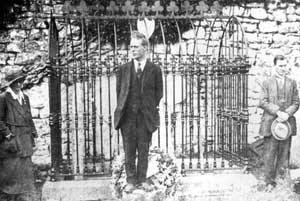‘It is fashionable nowadays to tell Ireland that she must forget. Forget what – her history? Woe to the country or the cause that forgets its history.’ – Liam Mellows, 1918
On this day 99 years ago the socialist-republican most fit to carry on where James Connolly left off was executed by the forces of British imperialism. James Connolly was executed in 1916 by the direct colonial hand of Britain whereas Liam Mellows was executed in 1922 by the far more pernicious semi-colonial force of the Irish Free State, but both fought and died for the same ideal – the Irish People’s Republic. After meeting Liam Mellows in 1913 James Connolly said to his daughter, ‘I have found a real man.’ Mellows more than lived up to this assessment, carrying forward Connolly’s ideals in fighting for the Republic against the forces of imperialism and then defending the Republic against the Free Staters who had gone over to the side of Empire.
Liam Mellows was recruited into the republican movement as a young man by Thomas Clarke in 1911, becoming one of the small influential circle that led Na Fianna Éireann and reinvigorated the revolutionary movement. He writes in familiar terms of the sorry state of the national movement and national feeling during this time:
‘The Anglicising influence of the so-called National Schools on the minds of the youth of Ireland, was such that they grew up ignorant of anything regarding their history. Irish history… left the impression that it was to England that Ireland was indebted for such civilisation and progress as was in the country… Parliamentarianism and the corruption that follows closely in its wake had sapped their national spirit.’ Britain’s aim being to ‘make a ‘happy English child’ out of the Irish boy.’
Today the U.S. and European imperialists have joined Britain in attempting to convince the Irish people of their inherent inferiority and the need to ape the imperialist nations politically, economically, culturally and in all other spheres (while, of course, remaining dependent and subservient).
By 1913, Mellows began to see positive developments for Ireland’s revolutionary struggle:
‘At long last some result was seen of the years of drudgery and ‘spade work’ on the part of the small minority who had stood true to Ireland through thick and thin. Slowly but surely the country was being roused from the lethargic and disorganised state into which constitutionalism had thrown it’
Reflecting on the 1914 split in the national movement with the Redmondite betrayal, sending thousands of Irishmen to their death in Britain’s war, Mellows had this to say:
‘A minority… still stood true… It is to these, who in the first instance, considering neither their size not their influence, nor shrinking from the terrible outlook that confronted them, stood out for principle first as against ‘safety first’, that Ireland is indebted for her salvation as a Nation. Had they, acting along the lines of least resistance, adopted an attitude of expediency, no matter with what ulterior motive, all would have been lost and the final object of England’s Irish policy accomplished.’
During Easter Week 1916 Mellows led the rising in Galway, escaping from an English prison in order to play his part and he fought till the bitter end despite facing many difficulties. Following the defeat of the Rising he fled to the U.S. where he developed a deep hatred for that country, despising the capitalist-imperialist society and all that went with it. Mellows was himself disliked by much of the conservative elements of the Irish-American support movement for his radical views, they went so far as accusing Mellows of being an informant. It is worth quoting at length his views of the U.S. which he wrote in a letter to his brother Barney for they have lost none of their relevance for that country and they speak to Mellows’ progressive ideals:
‘The sooner the people of Ireland turn their eyes away from and give up hope of securing their independence through this tír [country] the better. It is all cant, hypocrisy and big talk – bluff from start to finish and can at present be only compared to Russia previous to Revolution… The trusts and capitalists run politics here. The whole system – commercial, financial, legal and social is built on graft. Honesty is an unknown quantity. The bigger the bluff, the greater the man. The greater the rogue, the more wealthy respected and protected… journalism here accounts to fiction… Hope to God emigration is finished for this country has been the grave of the Irish race. A reaction on part of the American people is setting in though and a spirit of unrest is beginning to manifest itself. People will take long time to wake up though.’
He hoped (and would struggle) to see a very different kind of society develop under the guidance of the Irish Republic.
He returned to Ireland once the war for the Republic was well underway but, despite his preference for military action, he played mainly an organisational role, in particular procuring weapons for the struggle. When his socialist-republican ideals were threatened with betrayal by the surrender agreement of 1921 he was among those who most clear-sightedly argued for its rejection. With incredible clarity he foresaw what the ratification of the Treaty and the establishment of the Free State would mean for the cause of Irish freedom. He saw the acceptance of the treaty with Britain as equivalent to the overthrow of the Irish Republic:
‘the Republic does exist. It is a living tangible thing, something for which men gave their lives, for which men were hanged, for which men are in jail, for which the people suffered, and for which men are still prepared to give their lives… the acceptance of this Treaty destroys the existing Irish Republic. Whether we like it or not we become British subjects, British citizens… The very words ‘Irish Free State,’ so-called, constitute a catch-phrase. It is not a state, it is part of a state; it is not free, because England controls every vital point; it is not Irish, because the people of Ireland established a Republic… Ireland was put forth to the world as a headlight, as a beacon beginning to shine for all time to guide all those who were struggling… This downtrodden, this miserable country, as some of you called it, was, during the last few years, the greatest country in God’s earth… It has fought a fight that will ring down through the ages, and maintained itself well against all the tortures and inflictions that a foreign tyranny knows so well how to impose… and now, not through the force of the British Government, not because of the weight of the British armies, but through the guile of the British Government, and the gullibility of ours we are going to throw away the Irish Republic.’
In a stirring speech to the Dáil he outlined what happens to those traitors who make deals with imperialism:
‘I do not doubt that in five years hence… those men will not be Republicans… the new Government that would be set up if this Treaty is passed… would to us occupy the same position that Dublin Castle occupied in the past. It would simply stand between us and the British Government.’
He went on to say:
‘We know the day when you had the Irish O’Donnell’s the ‘Queen’s O’Donnell’s,’ and the Irish O’Reilly’s the ‘Queen’s O’Reilly’s.’ I wonder will we ever see the day when we have the Irish Republicans the ‘King’s Republicans’… Men will get into positions, men will hold power, and men who get into positions and hold power will desire to remain undisturbed and will not want to be removed, or will not take a step that will mean removal in case of failure.’
Seeing many former republicans over the last century become enforcers of imperialist rule – no longer a republican but ‘a bailiff for the conquest’ to borrow Peadar O’Donnell’s phrase – Mellows’ insight on this point is remarkable and must be understood and applied today. One hundred years on from this traitorous surrender to imperialism we can see the correct stance taken by Mellows (and many besides) in sticking firm to republican principles. The cries from the Treatyites to abandon principles for expediency have been proven false by Ireland’s continued oppression and subservience at the hands of imperialism one hundred years on:
‘we… had unity in Ireland during the last few years, but we had it only on one basis – the basis of the Republic. Destroy that basis and you cannot have unity. Once you take yourselves off that pedestal you place yourselves in a position to pave the way for concession after concession, for compromise after compromise. Once you begin to juggle with your mind or conscience in this matter God knows where you will end, no matter how you try to pull up later on.’
In the end the surrender was backed by a slight majority of the Dáil but Liam Mellows could not accept the counter-revolutionary subversion of the Irish Republic for which he had dedicated his entire adult life:
‘We are warned of the consequences of a split or division, but you can only have unity on the principle and those who will depart from this principle are… responsible for any division or split because those who will alter the status of Ireland from a Republic will cause any division or split… of stopping a split… there is one way it can be done and that is by the rejection of this Treaty. You can come with us but we who are against it cannot go with you.’
True to his republican principles and the cause of the Irish nation Mellows led the revolutionary forces against the British-backed Free States forces and fought on until the Four Courts garrison in Dublin was forced to surrender under the bombardment of English guns. Awaiting his execution at the hands of the inconstant bourgeois elements of the national movement who had achieved leadership of the struggle (and immediately sold it out) Mellows understood clearly the need to rely on the working people to carry out Ireland’s liberation and that, despite the beliefs of the reformist left, the Free State could not be used as a tool to bring the working class to power. He wrote:
‘It is a fallacy to believe that a Republic of any kind can be won through the shackled Free State. You can’t make a silk purse out of a sow’s ear. The Free State is British created, British controlled and serves British Imperialist interests. It is the buffer erected between British Capitalism and the Irish Republic. A Worker’s Republic can be erected only on its ruins. The existing Irish Republic can be made the Workers’ and Peasants Republic if the labour movement is true to the ideals of James Connolly and true to itself.’
In 1915 James Connolly invited Irish revolutionaries to ‘sit down and calmly reason out to yourself how far we have gone to the reversal of that conquest – how far we have still to go.’ It might be said that, despite all the sacrifice and bloodshed over the last century, due to further betrayals we have not come much father than where Liam Mellows left off. An occupied six counties and a semi-colonial twenty-six county state, beholden to and dependent on imperialism, was the state of play when Liam Mellows was executed on 8 December 1922. Our task today remains the same as that which caused him to join the struggle, which roused him to rise up in 1916, and which, against the protestations of the ‘practical’ reformists, led him to renew the fight for Irish freedom in 1922. That task, for which he gave his life and his death, is the establishment of the Irish People’s Republic, the one and only guarantor of the freedom of Ireland.

